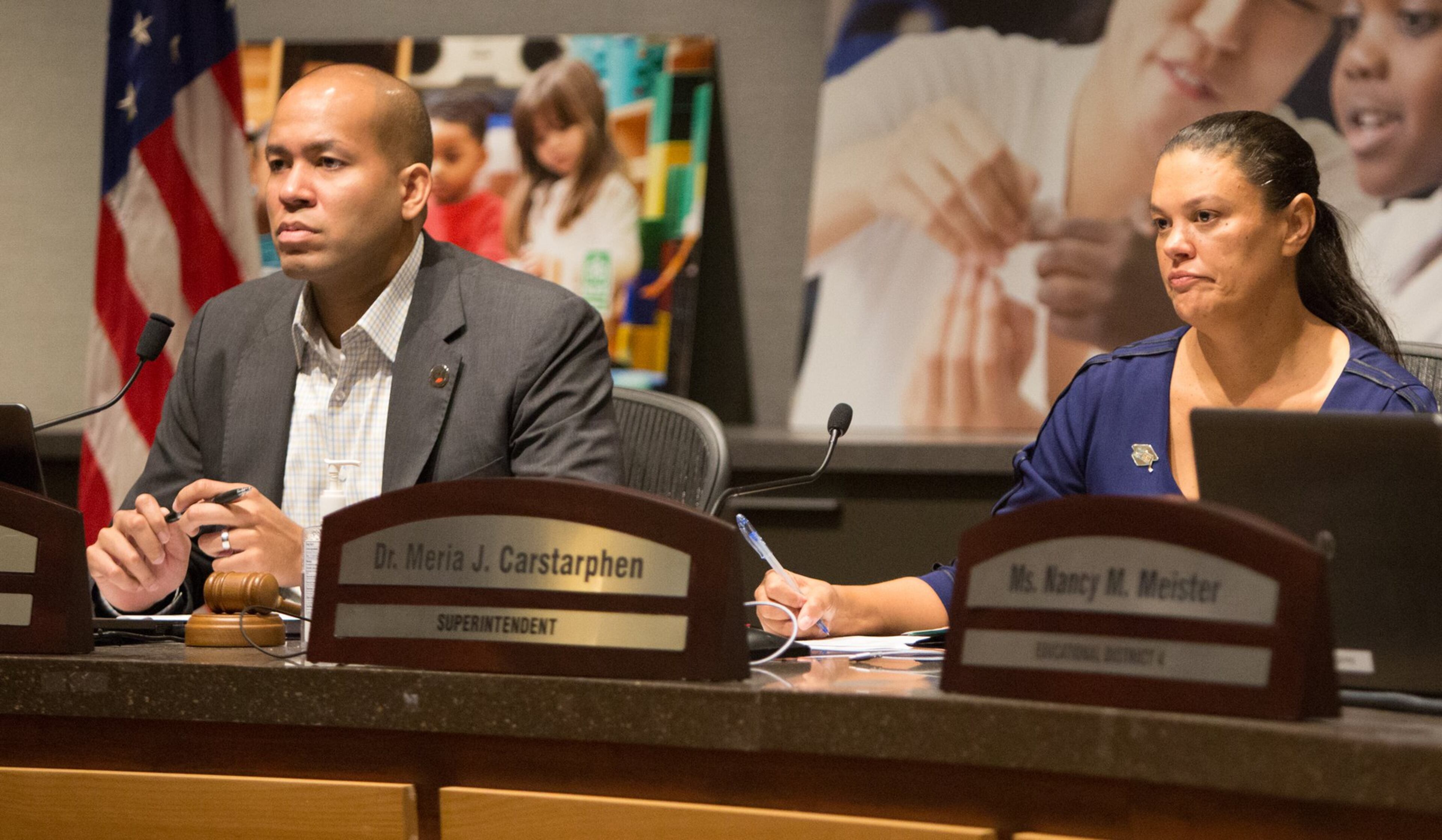Torpy at Large: Carstarphen pulls APS from ditch, gets tossed into it

So much for longevity, continuity and keeping on track with a school turnaround that is generational in its undertaking.
A divided Atlanta school board this week announced it will bounce Superintendent Meria Carstarphen, the driven and sometimes mercurial administrator hired five years ago in the wake of the Atlanta Public Schools cheating scandal.
Actually, the board members are not bouncing the superintendent, they’re simply not extending her contract. So she’ll slowly fade away, with a June 30, 2020, end-on date, leaving her Atlanta career to age like a carton of milk at Kroger.
Board members have bumped heads with the superintendent, who seems to be everywhere all the time and doesn’t suffer fools easily, the latter being those who disagree with her.
The board knew coming in that she could be prickly and bruise egos. That was her report card from Austin, Texas, where she turned around an even larger system.
The fact that the board is now hiring a PR firm to help "communicate the will of the board" demonstrates that its members know a storm is a-brewing and they need cover. Parents, teachers, students and even a collection of Atlanta's who's who have come out publicly in support of her rehire.

A squishy dose of PR malarkey came in handy for board chairman Jason Esteves on Monday when WABE’s Rose Scott kept trying to pin him down on why he flipped from the Ain’t-she-wonderful? camp to the Run-‘er-off posse.
Esteves was elected in late 2013 as part of a reform-oriented board that hired Carstarphen just a few months later. It's like the two have grown up together in Atlanta school politics.
Earlier this year, he gave Carstarphen a glowing review: “As a board we remain pleased with her progress to implement our collective vision for the system. We are on target with the five-year strategic plan through this mid-year evaluation check-in process. Dr. Carstarphen has demonstrated progress in her performance goals for this school year.”
But when the radio host this week tried to get Esteves to elucidate why the superintendent was getting ousted, he kept mumbling something about “collaboration” — a feel-good, gobbledygook term he used at least six times. (I’d listen to the tape again for an exact count, but I’d lose 25 minutes of my life again.)
The thought being put out there is that Madam Superintendent was tough to work with, although concrete examples thus far have been nonexistent.
The board knows it needs some high-paid crisis PR because Carstarphen was her own publicity-generating juggernaut. Not long after her hire, she became the Face of the System, a presence at PTA meetings, school dances and the endless education-oriented gatherings.

Two summers ago, I saw her at a football practice at Benjamin E. Mays High School, an ongoing activity where she’d arrive at a school, don pads and a helmet, run through drills and catch a couple of passes. During this particular drill, she pulled up lame and had to be helped from the field. Still, she limped back to address the team and shoot a ton of selfies. Sure, it was shtick. But the next day, 50 kids who were opinion leaders at their school told other students about their crazy (in a good way) superintendent. It showed them someone up there gives a hoot.

When Carstarphen started in 2014, she wrote an editorial remembering advice from Georgia’s own U.S. Rep. John Lewis: “You must find a way to get in trouble — good trouble, necessary trouble.”
“And that’s exactly what we need to do in APS — shift from bad trouble to good trouble,” she wrote. “APS has had its full share of bad trouble.”
And Carstarphen got the trouble rolling. She closed and merged low-performing schools, increased social services, and increased the impact of charter schools — a move that caused the head of the Atlanta Federation of Teachers to say, "The lady is poison for this city." Others have criticized financial accountability in the district.
Still, graduation rates have risen about 20 points to nearly 80 percent, principal turnover has largely ended, and the teacher exodus has been quelled.
But personalities on the board change. And interpersonal interactions being what they are, the board last year voted 6-3 to extend her contract, an action that showed the bloom might be coming off the Carstarphen rose.
In July, it became apparent that Carstarphen didn't have five votes to stay on. The board is down to eight members because one spot is vacant, so a 4-4 vote means "No." Esteves, a longtime supporter, flipped. "We thought given where we are with a new strategic plan, we were either going to double down on Dr. Carstarphen's leadership or move toward a new leader," he told my colleague Maureen Downey.
So they will go with Plan B. They’ll try to find someone they can play along with, someone (I suppose) more pliable and able to bend to their will.

One can assume that hard-charging, independent-minded candidates might think twice about coming to a place that ran off the last superintendent without a good explanation.
Nancy Meister, the board’s longest-serving member, was there before the cheating scandal exploded in 2010 and 2011, and was all for bringing Carstarphen back. In an email The Atlanta Journal-Constitution obtained, she accused the chairman of not being “transparent” in dealing with the contract, adding: “I feel we are headed down a disorganized path that is not putting the interest of kids first.”
I called Meister and asked about problems “collaborating” with the now lame-duck administrator.
"I've had more collaboration with this superintendent than Dr. (Beverly) Hall and Erroll Davis," the two previous superintendents, Meister said, forecasting a hard, perhaps fruitless search. "I've been around long enough to know we won't find anyone better."

